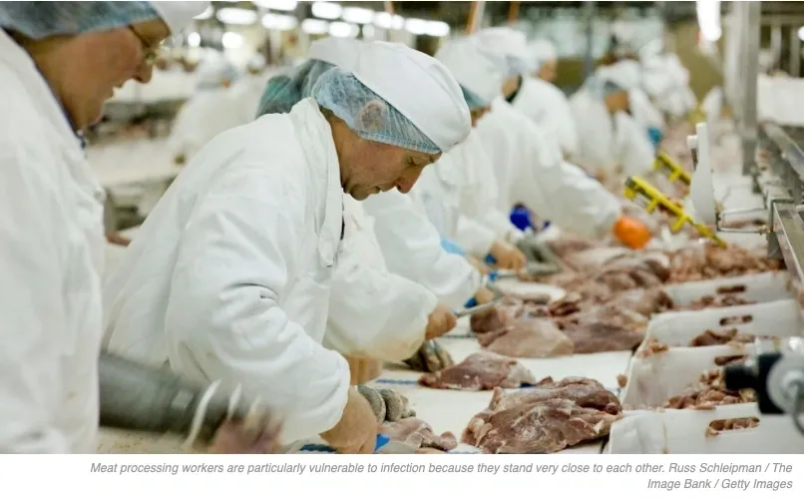Meat Processing Plants Close: Working Conditions Encourage Spread

Meat Processing Plants Close: Working Conditions Encourage Spread
By: Olivia Rosane

Meat processing plants across the U.S. and Canada are being forced to close as employees sicken with the new coronavirus, raising concerns both for the meat supply chain and worker safety at the often crowded plants.
One of the biggest closures to date was Sunday's indefinite shuttering of a Smithfield Foods plant in Sioux Falls, South Dakota that is responsible for around five percent of the U.S. daily pork supply, as The Associated Press reported. Its closure came after almost 300 of its 3,700 workers tested positive for the virus that causes COVID-19.
"The closure of this facility, combined with a growing list of other protein plants that have shuttered across our industry, is pushing our country perilously close to the edge in terms of our meat supply," Smithfield President and CEO Kenneth M. Sullivan said in a statement announcing the closure. "It is impossible to keep our grocery stores stocked if our plants are not running."
Other plants have shut their doors, at least temporarily, according to Reuters. They include:
- A JBS USA plant in Greeley, Colorado that is responsible for five percent of the U.S. daily beef slaughter, which said Monday it would close until April 24.
- A Tyson Foods hog slaughterhouse in Columbus Junction, Iowa that said Monday it would extend an April 6 closure for another week.
- A National Beef Packing Co. plant in Tama, Iowa that suspended cattle slaughtering until the week of April 20.
- An Olymel pork plant in Yamachiche, Quebec, that closed for two weeks starting March 29.
- A Maple Leaf Foods poultry plant in Brampton, Ontario that suspended production April 8.
Overall, hundreds of workers have fallen ill at plants in Colorado, South Dakota, Iowa, Pennsylvania, Mississippi and other locations, according to The Associated Press. Meat processing workers are particularly vulnerable to infection because they stand very close to each other on assembly lines and share crowded locker rooms, leading some food safety and worker advocates to criticize companies and the U.S. Department of Agriculture (USDA) for not doing more earlier to prevent the spread of the virus.
"Social distancing is impossible in meatpacking plants," senior government affairs representative for Food & Water Action Tony Corbo said in a statement emailed to EcoWatch. "The plants are incubators for spreading COVID-19 and neither the plant owners nor the USDA has provided adequate personal protective equipment (PPE) for workers and inspectors to use while on the job. Workers and inspectors at these plants must be immediately tested for COVID-19 and then immediately provided PPE and hazardous duty pay. We must treat these people who are critical to ensuring the safety of our food supply like the frontline workers that they are."
Food & Water Action said the Smithfield plant should have been closed weeks ago. But, as Newsweek reported, it only closed following a letter from South Dakota Governor Kristi Noem and Sioux Falls Mayor Paul Ten Haken Saturday, asking the plant to close for 14 days. When it was sent, 238 of the states's 626 cases were among Smithfield employees.
"This is your moment to take swift action for your people, the community of Sioux Falls and the State of South Dakota," Noem and Ten Taken wrote. Smithfield workers at the shuttered plant will receive full pay for the next 14 days. It is hard to know how much plant closures will impact U.S. meat eaters. So far the decreased production has been offset by meat stored in freezers, Kansas State University agricultural economist Glynn Tonsor told The Associated Press. "You could shut multiple plants down for a day or two, and we've got wiggle room to handle that," said Tonsor. "But if you took four or five of those big plants ... and they had to be down for two weeks, then you've got a game changer."
For animal welfare advocates, however, the spread of the new coronavirus at meat processing plants is just another symptom of the industry's disregard for both human and animal life.
"Even without the connection to coronavirus, animal flesh is one of the most cruelly obtained and unhealthy things you could consume," People for the Ethical Treatment of Animals wrote. "Eating meat has been conclusively linked to heart disease, cancer, obesity, and other health issues — and according to the United Nations, animal agriculture is responsible for nearly a fifth of human-induced greenhouse-gas emissions. But each person who goes vegan won't just help fight climate change — they'll also save the lives of nearly 200 animals a year, animals who, just like us, don't want to be killed. Don't wait for COVID-20 — forget freezer meat and go vegan now."
